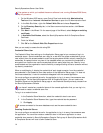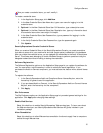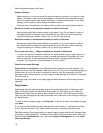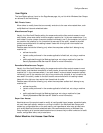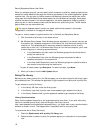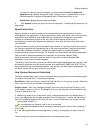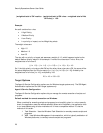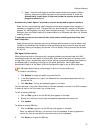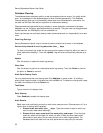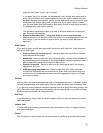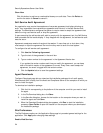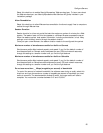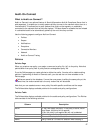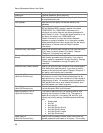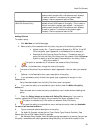SecurityExpressions Server User Guide
22
Database Cleanup
The database stores data about audits, as well as console and server events. You might decide
that it is unnecessary to use database space to retain this data permanently. The Database
Cleanup settings allow you to automatically delete data from the database on a schedule. You
can also use the Clean Now button to perform an unscheduled cleanup.
Cleanups delete data generated by any console or server application connected to the same
database, not just the server application executing a cleanup. They also clean up data generated
by Web services, the COM object, and the command line.
Event-log cleanups and audit-data cleanup tasks are scheduled and run independently from each
other.
Event Log Settings
SecurityExpressions retains a log of console and server events that it stores in the database.
Perform daily discard of event log data older than __ days
To clean up the event log, check this box and type the number of days for which you want to
retain data before deleting it. Then click Update. Log entries are automatically cleaned up at
2 a.m.
Update
Click this button to update the event-log settings.
Clean Now
Click this button to perform an unscheduled event-log cleanup. Then click Delete to confirm
the action or Cancel to cancel it.
Audit Data Cleanup Tasks
You may create more than one cleanup task. Click Add New to create a task. To modify an
existing task, locate the task in the table and click the Edit link. To delete an existing task, locate
the task in the table and click the Delete link.
Task Name
Type a name for this cleanup task.
Daily Cleanup
Check Enabled to enable this cleanup task.
Audit Results
Select how much audit data you want to retain when cleanups occur. Cleanups occur at 2 a.m.
nightly when a cleanup task is enabled.
• Discard audit data older than __ days - Type the number of days for which you
want to retain data before deleting it.
• Discard all but most recent audit for each policy and target - From the drop-
down list, select the time span for which you want to keep the most recent audit
performed on each policy file you used to audit and on each target audited. The
database retains the data from one audit performed on each policy file and each



